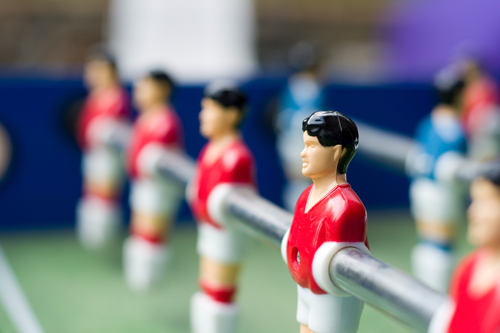 It’s often referred to as the magic ingredient after a sports team or work group wins a championship or lands a prestigious client. It’s team chemistry, the X factor that defies the stats and resumes, enabling even so-so talent to synchronize efforts into a march toward victory.
It’s often referred to as the magic ingredient after a sports team or work group wins a championship or lands a prestigious client. It’s team chemistry, the X factor that defies the stats and resumes, enabling even so-so talent to synchronize efforts into a march toward victory.
Many teams underachieve because too little attention is paid to this factor. But exactly what kind of oversized molecules are involved in team chemistry? Of course, chemistry requires a chemist, and that role needs to be filled by the coach or project leader. Here are 9 strategies that help team leaders establish and maintain winning team chemistry:
- Speak the language of team members. This is especially important for coaches of sports teams. In-demand sports psychologist Joe Carr, who has served as a consultant to some 40 college teams as well as high-profile NBA stars such as LeBron James and Carmelo Anthony, has been commended for the way he secures trust by speaking the lingo of his players. Coaches should do the same. Having “street cred” with players helps the coach be part of the team, which makes the players more receptive to his advice.
A common language doesn’t always have to be spoken, however, as evidenced by the actions of my high school cross-country coach. While the team did laps around the track, he would often run right alongside one of us, sometimes for a hundred yards or so, providing advice about running technique. His habit of “meeting us where we live” helped endear him to the team, giving us a sense that he was beside us every step of the race during track meets.
- Clearly define the roles and expectations for each player. A lack of attention to this factor has been the downfall of many a team. Players need to understand their roles and to accept them from the start, and the right skills need to be matched to the right position. Placing too great a burden on someone without exceptional talent will just create frustration, and it is up to the team leader to keep his/her antennae up for this setback; many players will just suffer in silence. Re-assigning roles can help change the chemistry to create a more positive, winning atmosphere.
I faced this myself some years back when I started a new job with a title that was beyond my experience. My co-workers made assumptions about me because of that title, and as a result certain aspects of the job were not explained to me in the early weeks. This resulted in a lot of stress and frustration for the team and myself until I got up to speed.
- Learn what certain members have in common. Arranging for members who have similar backgrounds or interests to work closely together can promote camaraderie and a more positive attitude for the task at hand. This strategy can also establish an “I’ve got your back” loyalty that instills a sense of security in the team.
- Keep the channels of communication open. Players need to feel they have the coach’s ear, as well as feel connected to one another. Frequent team meetings where everyone’s opinions or comments are actively sought help build the confidence and comfort level of all participants. Without this open communication, more extroverted people may end up dominating a team, while introverts who might have important contributions hold back.
- Deal with the isolators. People on the team who keep too much to themselves can cast a shadow on the overall team effort. They are often misunderstood as being arrogant, when in many cases they actually feel out of place and awkward.
Dr. Carr has often been hired by sports teams to help players from foreign countries adjust to the culture shock of living in the U.S. Part of his strategy is to find areas of common ground between these players and their American teammates that help break down resistance and establish a comfort zone.
- Maintain the right balance between praise and criticism. Relentlessly praising someone regardless of performance can result in little motivation to improve. Conversely, constant criticism casts a negative spin on a team member’s behavior; the main motivation then becomes fear of failure and punishment rather than desire to win.

I’ve had two dramatically different sports experiences that underscore this point. In middle school, I played on a baseball team with a dictatorial manager who would berate us loudly for mistakes but not even acknowledge us when we got big hits or halted an opponent’s rally. After one game where we didn’t play very well, he made us sprint around the bases once for each error (7 circuits) and do 100 push-ups! This management by fear built up resentment among the players and gave us a quick trigger finger for condemning one another. Despite our good talent pool, we lost more than we won that season. Fast forward to my men’s softball team 20 years later, whose coach was continually supportive and whose players never openly chastised anyone for making a mistake. Praise for doing well, however, flowed freely every inning. Despite having decent talent but a dearth of superstars, our team made it to the finals two years straight and won a championship.
- Acknowledge contributions by both stars and nonstars. Citing individuals for outstanding performance helps maintain personal motivation and dedication to the team effort. But appreciation should also be given to nonstarring players when they demonstrate a strong commitment to improving their performance. Keeping the lesser talents motivated can sustain hard work that may lead to personal breakthroughs, rewarding both them and the team.
- Promote a sense of family. Feeling like part of a family helps players care more about one another and be more committed to the team’s quest. Social gatherings off-site can promote this sense of family by allowing people to get to know each other better. Extroverts can play a key role by helping others feel more at ease with the rest of the team.
Praise from a “family member” takes on a sincerity and legitimacy that build genuine confidence. With this type of bond, there is also a sense of building on a foundation that gets stronger and a feeling of oneness that resonates after team members leave the field or conference room.
- Continue to nurture the team throughout the season or project cycle. Too often, most of the attention is put into forming the team. Having the right players and structure in place doesn’t guarantee a smooth and steady progression toward better performance without the right support along the way. As noted in Psychology Today by Liane Davey, Ph.D., author of You First: Inspire Your Team to Grow Up, Get Along, and Get Stuff Done, “Machines are very susceptible to the damage of friction as parts grind on one another and create wear and tear. In teams, this friction comes from different styles, poor communication skills, and unhealthy conflict.” According to Davey, it is important to pay attention to these differences and take steps to minimize their negative effects on the team.
Good team chemistry requires attention to a number of factors. The payoff: Performance may exceed all expectations.
Click here to see Rose’s tips for healthy and happy relationships
If you enjoyed reading this article, you might also like:


